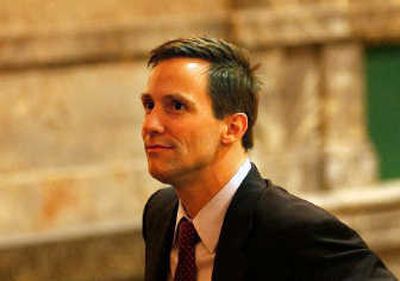Bill seeks ‘government welfare’ label

OLYMPIA – In a move clearly aimed at anti-tax conservatives in places like Eastern Washington, some liberal Puget Sound-area state lawmakers proposed withholding state utility-project cash from rural communities unless local voters acknowledge that the money is “government welfare.”
The tongue-in-cheek bill was dead on arrival, with state Sen. Darlene Fairley, a committee chairwoman, pronouncing it purely rhetorical at a recent hearing.
But it riled some rural lawmakers, including an Eastern Washington senator who suggested that seceding from Western Washington might be the answer, a perennial threat leveled and withdrawn nearly every year by lawmakers frustrated with the Puget Sound region’s political clout.
Prime sponsor Sen. Eric Oemig, D-Kirkland, said Senate Bill 6291 was intended to show taxpayers where the money comes from “so they’d be better-informed when they’re asked to approve levies in their own communities.”
For years, the state has used a complex formula to distribute real-estate excise taxes from a “city-county assistance fund.” The formula tends to shift dollars from the most populous cities and counties to more thinly populated areas.
“Here we have a situation where we have some governments that are actually spending someone else’s money,” Oemig told lawmakers at a hearing last week.
“And they don’t even know in most cases that that money has come from my district.”
Fairley, D-Seattle, had a pithier description of Oemig’s bill: “It says that King County’s paying for the rest of you, is what it says.”
Sen. Adam Kline, D-Seattle, suggested adding the same requirement for transportation dollars. King County and other urban counties typically get back less than $1 in transportation projects for every dollar they pay in gas taxes, he said. But some rural counties get back several dollars for every gas-tax dollar they contribute.
In such cases, Kline said, those rural counties should “be required to vote on whether to accept this largesse.” A co-sponsor of Oemig’s bill, Kline said he’d like to introduce a bill to include transportation dollars next year.
Lawmakers from rural areas panned the bill.
“The word ‘welfare,’ I think my citizens would object to that,” said Sen. Tim Sheldon, D-Potlatch. “… It is one state.”
The state utility dollars help build sewer lines that protect water quality in places like Hood Canal, he said.
“A lot of that was already built in King County when you were elected,” he told the proponents. “We’re still trying to get ours.”
Sen. Bob Morton, R-Orient, said the bill would cover several of the northeastern Washington counties he represents. Calling the state money welfare, he said, “is quite disturbing.”
With a sparse population and little taxable land, Morton said, places like Ferry County are already struggling with things as basic as sending out ballots for next week’s presidential primary election.
They shouldn’t have to pay for more elections to declare utility construction grants welfare, he said.
He criticized state regulations, which he said are suppressing local industries like mining.
“We would be delighted, Sen. Oemig, to sit down with you and go through the possibility of changing the boundaries,” Morton said, “so that you would no longer need to have us as a welfare brother.”